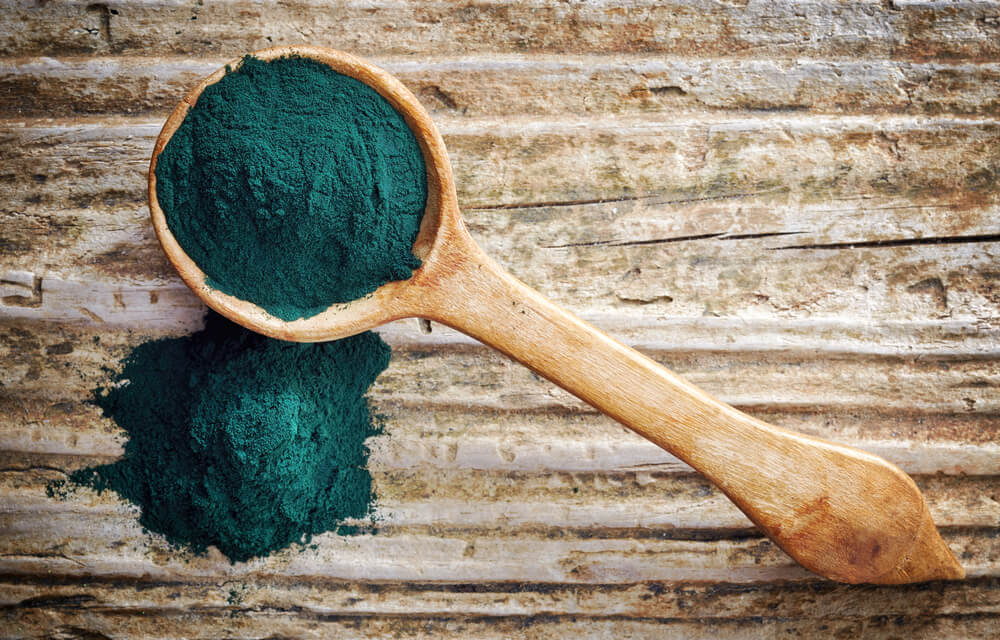
What the heck is spirulina? You need it and you’re going to love how it helps you achieve your fitness goals. Trust us! Read on to find out about the spirulina Benefits!
You may have never heard of spirulina before. But, you soon will.
Why?
It is quickly becoming one of the most popular superfood supplements out there. It is a cyanobacterium that is 60% protein in its dried form and is completely edible.
Cyanobacteria are a type of blue-green algae that, like most plants, get their energy through photosynthesis. They are one of the most biodiverse organisms on the planet. These are tough little guys that grow best in tropical climates. But, they can be found anywhere from the arctic tundra to the desert. They can be found on land and in water. Cyanobacteria-like spirulina are especially abundant in water. That’s why spirulina is already a supplement in many fish foods.
It also occurs naturally, usually in lakes in Africa, Asia, and South and Central America. But, there are many places that cultivate and produce spirulina. For example, countries like the United States, Thailand, India, Taiwan, Bangladesh, Pakistan, Greece and Chile are all producers.
Spirulina is available as a whole food. It comes in table, flake and powder form. It’s a great supplement because it has all the essential amino acids in addition to its high protein content. When harvested correctly from clean ponds or algae farms, spirulina is one of the most potent sources of nutrients you can find.
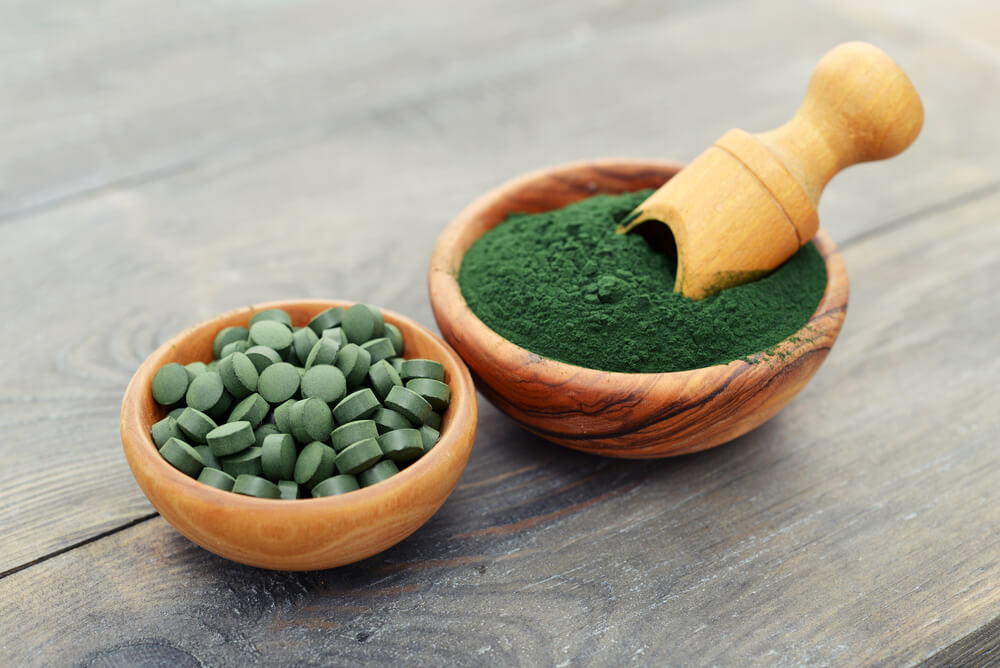
What Is Spirulina?
Vegans and vegetarians are the ones who can benefit from it the most.
Why?
Simple, the benefits come as a result of its high natural iron and protein content. With that said, it is a great addition to any diet. Though not quite as good as the nutrients and proteins found in milk, eggs and meat, spirulina does have more nutrients than typical plant proteins. It is also a great source of B vitamins, iron, and manganese when taken regularly.
Here’s a breakdown of the recommended daily allowance (RDA) of vitamins that just one tablespoon of spirulina contains: 11% of the Vitamin B1 (Thiamin), 15% of the Vitamin B2 (Riboflavin), 4% of the Vitamin B3 (Niacin), 21% of the Copper and 11% of the Iron RDA. Also, roughly 4 of the 7 grams that make up a tablespoon of spirulina are protein. If that doesn’t sound good enough, these vitamins, minerals, and proteins all come in just 20 calories.
Spirulina has also been proven to have at least trace amounts of almost every other vitamin and mineral that we need for a healthy diet. With benefits like these, it’s no wonder that health scientists are bringing this simple alga into the limelight.
What Does The Science Show?
In fact, many studies have been done on spirulina, and they all show that there is little to no toxic effects to its use as a supplement. The use of spirulina actually goes way back to the time of the Aztecs where records show that they used it almost daily. It stopped becoming a staple around the 16th century when lakes began to be drained for development purposes. That’s when it sort of fell off the map.
But, researchers noticed that spirulina has been shown to clean out some harmful things in water such as lead. As well, since it can grow well in almost any climate and zone, NASA recommended it for use in space travels for the astronauts to cultivate and eat. This move is what brought spirulina back into the limelight.
What Are Some Of The Spirulina Benefits?
Spirulina is a fantastic source of healthy eating, but it has many other benefits besides having almost all the vitamins and minerals that you need. It can also contribute to your health in other ways such as reducing cholesterol or the risk for cancer and heart disease.
Spirulina is an effective antioxidant. That means it protects against oxidative damage in DNA that can cause chronic inflammation or even cancer. This component of spirulina is actually what gives it its lovely blue-green color, so you can literally see the healthy benefits. But spirulina is also a good defense against heart disease because its use can lower LDL levels (the bad type of cholesterol). While it’s lowering those LDL levels, spirulina raises your HDL levels (the good type of cholesterol).
The high amounts of protein and iron have rejuvenating effects on the body. That makes it ideal to use during pregnancy or after surgery to boost the immune system and keep your body functioning well. With that said, it is recommended to consult with your doctor to ensure that your body will be able to benefit from spirulina under either of these conditions.
Spirulina has a high concentration of natural iron and is not only great during pregnancy and for recovering after surgery, but it is also beneficial to those struggling with anemia. There are a few different forms of anemia. The most common type reduces the hemoglobin or red blood cells in the blood. This is very common in older people and can cause prolonged symptoms of fatigue or feelings of weakness.
A study was conducted in which 40 older people with a history of anemia were given spirulina supplements. After a few weeks, it was found that spirulina increased the hemoglobin content of the subjects’ red blood cells. Not only that, but the overall immune functions improved as well. The proteins and nutrients in spirulina have been proven to be very bioavailable and easy for the body to absorb, which is also a helping factor for those with weak immune systems.
One lab test of spirulina done by a private lab found that it has an ORAC (Oxygen Radical Absorbance Capacity) of over 24,000. That is four times more than the ORAC score of blueberries. The ORAC score typically measures the antioxidant ability and concentration in various foods. That means it has more antioxidant power than blueberries, which are popular for their use as antioxidants.
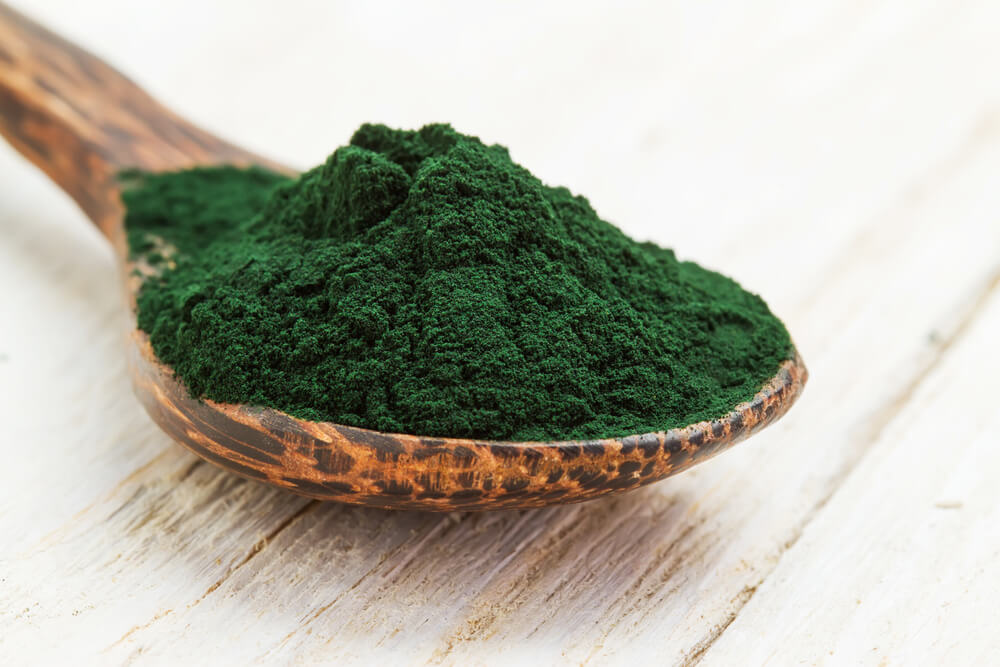
What Is Spirulina Good For?
Spirulina on its own doesn’t have the best taste. It has actually been described as tasting like pond scum. Sadly, that isn’t too far from the truth as that’s what it is. On the bright side, it comes in many different forms. These forms make it easily incorporated into meals and recipes.
Spirulina has the essential fatty acid gamma-linolenic acid (GLA), which is known for its anti-inflammatory properties, especially when taken with omega-3 supplements like cod liver oil. GLA is often hard to find in natural food sources, so the body is left to cope with this by creating it. Of course, with supplements, the body doesn’t have to go through all that work.
It also has extremely high amounts of chlorophyll. This can actually help to remove toxins from the blood and give an extra boost to the immune system.
It also has very high amounts of calcium. In fact, it contains over 26 times the calcium that is found in milk. That makes it a great choice of calcium for kids, the elderly and during pregnancy.
Some research done on spirulina has found reasons to believe that it could be helpful for those with allergies and who experience moderate to severe allergic reactions. It is particularly helpful with allergic rhinitis. That’s the inflammation of the nasal airways that is the result of common environmental allergens like animal hair, pollen or ragweed.
In one study, a group of 127 people with allergic rhinitis were given 2 grams of spirulina per day. It was noted that they all experienced dramatically reduced amounts of nasal discharge, sneezing, nasal congestion and itching. Of course, these are all common symptoms of these types of allergies.
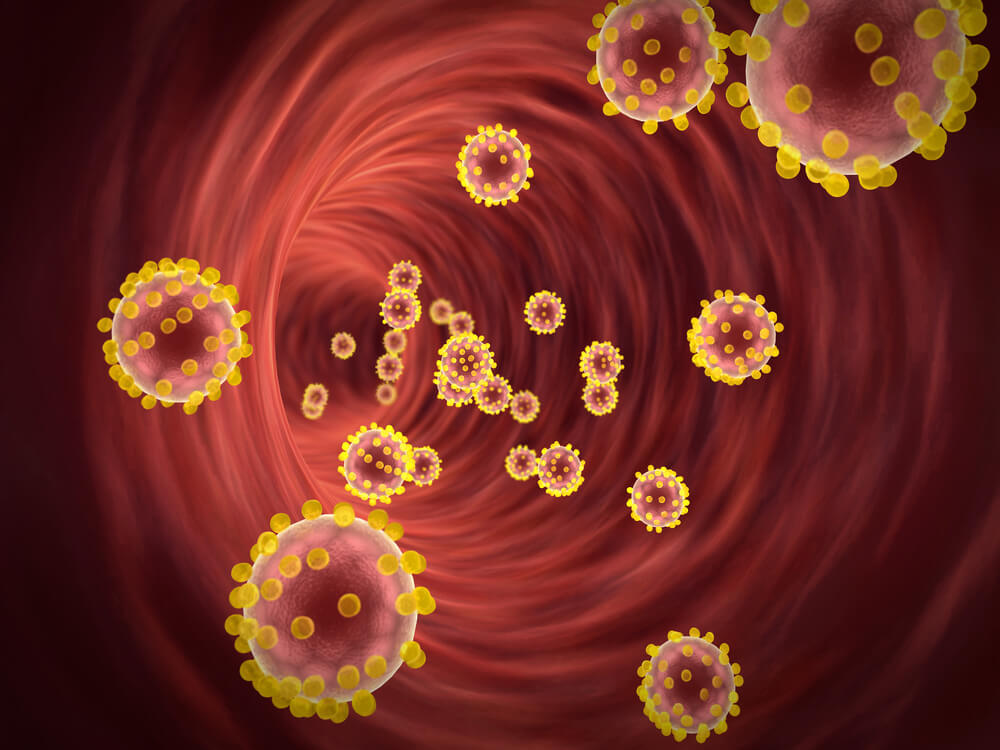
This Is How It Fights Diseases
Spirulina can reduce blood pressure as well. High blood pressure is responsible for many killer diseases such as heart attacks and strokes. The daily recommended dose of spirulina is usually not enough to be effective in reducing blood pressure. But, studies have shown that 4.5 grams per day can do the trick because spirulina helps to increase the body’s production of nitric oxide. This tells the blood vessels to relax and dilate, allowing blood to move more easily through the body.
Some studies have shown that it can lower high blood sugar levels. Needless to say, that’s great news for those who have diabetes. In one study, 25 patients diagnosed with type-2 diabetes were given 2 grams of spirulina daily for two months.
The result was a significant reduction in blood sugar levels. It worked because spirulina targets HbA1c. That’s a marker for long-term blood sugar levels. They were found to have dropped from 9% to 8%. That may not seem like a lot. But, diabetes studies estimate that even this 1% reduction of that marker can lower the risk of diabetes-related death by a whopping 21%.
This Is How It Can Help Your Workouts
Since oxidative damage has been linked to muscle fatigue, spirulina can also be used to help your workouts.
How?
It can rejuvenate and restore muscles. The antioxidant properties found in it can help athletes and any extremely physically active individuals minimize or treat this damage.
Two studies were done where it was proven to enhance endurance. The test subjects took longer to experience any symptoms of fatigue. Another study of college athletes showed that a daily supplement of spirulina increased overall muscle strength, although their endurance remained about the same.
Other minor studies have found many other benefits to spirulina supplements. Like what? The phosphorus content in it can help strengthen teeth. Spirulina can also increase the amount of fat burned during exercise. That means it can help you lose weight faster.
But, that’s not all. It also removes heavy metals from the body by binding with them and carrying them out through waste. There is also some evidence that suggests that this binding property also binds with radioactive isotopes. This can help those that are exposed to radioactivity or who are undergoing radiation therapy.
While many of the studies mentioned have had great results, it is vital to note that research on spirulina is fairly new, and there have been little duplication of these studies. There has also been a bit of a debate on whether or not it is a good source of vitamin B12.
Why?
It seems that what was thought to be B12 is actually more of a pseudovitamin that doesn’t really have any effect at all on humans.
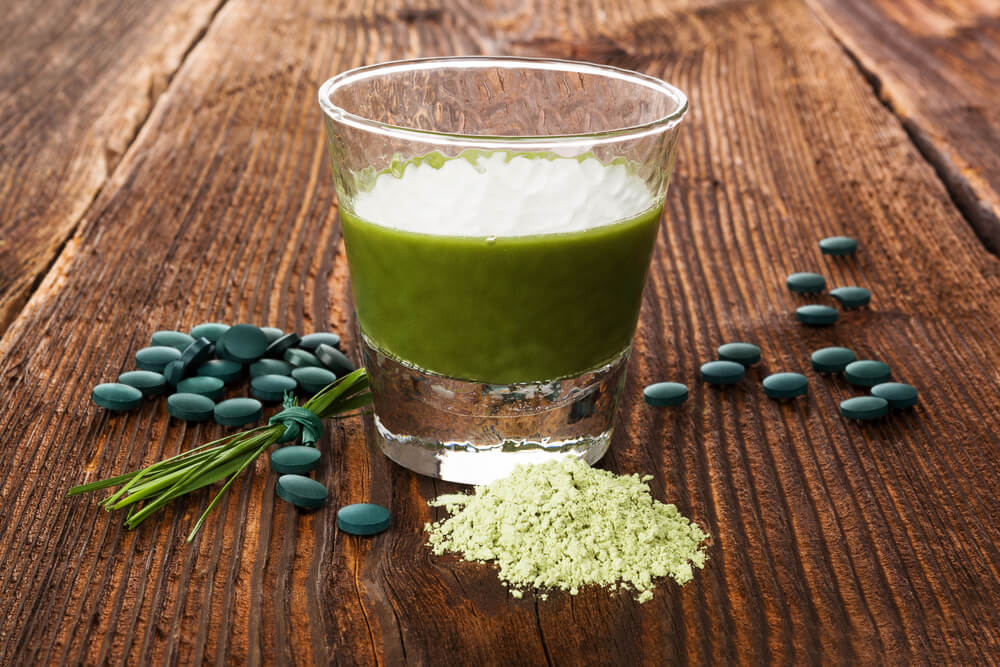
How To Eat Spirulina?
Once your doctor gives you the thumbs up on adding spirulina supplements, there are a couple ways you can include this superfood in your diet. Choose spirulina that is listed as organic.
Why?
Simple, to ensure that you aren’t getting any supplements that may have been bred in contaminated water because these may have harmful nitrate compounds. This is for the fresher form of spirulina (the kind with the fairly unpleasant taste).
Most tend to prefer the tablet or powder supplements. The powder form of spirulina can easily be added to smoothies and protein shakes. If you don’t like the taste, this is your best bet. On the other hand, there are some who simply mix it with water.
It is a good idea to up the dosage when you’re sick to give your immune system a boost. The same applies if you are pregnant, have been exposed to radiation or if you’ve just come out of surgery. There are a few cases where people with certain medical restrictions such as autoimmune diseases should not take spirulina as the response may not be great. If you are unsure in any way about the effects that these supplements may have on you, then you should check with your doctor first before adding them to your diet.
Conclusion
Spirulina is catching on fast.
Why?
There are too many benefits to ignore. The boost they could give your workouts are just the tip of the iceberg. If you’re looking for an endurance boost or help with muscle fatigue, you might want to give it a try.
The added benefits just put this supplement over the top.
By Sara Campanelli
Latest posts by Sara Campanelli (see all)
- Spirulina Benefits: The Supplement You Need To Try - Aug 4, 2016
- Gym Guide For Beginners - May 1, 2016
- Clean Eating Grocery List - Mar 27, 2016











[…] Spirulina Benefits: The Supplement You Need To Try – Gym Junkies – Aug 4, 2016. It can also contribute to your health in other ways such as reducing cholesterol or the risk for cancer and heart disease. Spirulina is an effective antioxidant. That means it protects against oxidative damage in DNA that can cause chronic inflammation or even cancer. This component of spirulina is actually. […]